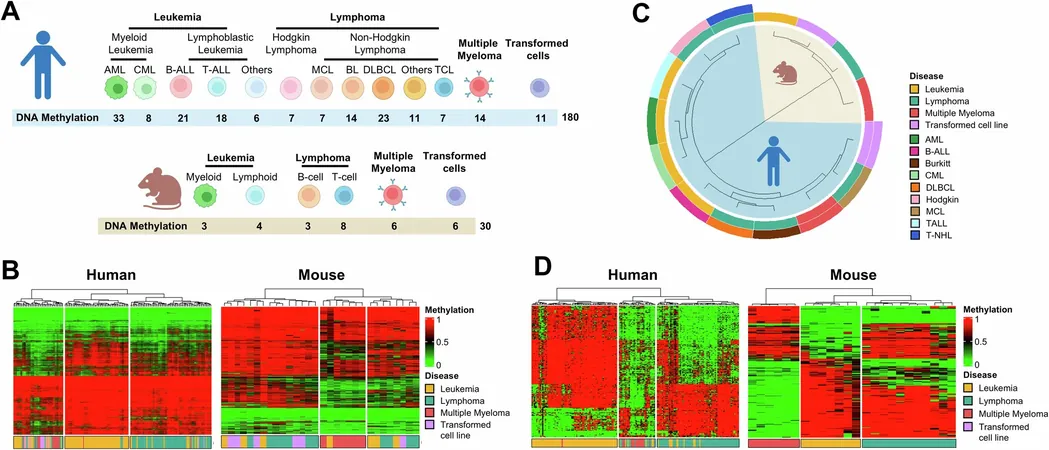
Discover How Your Age at Diabetes Diagnosis Could Spell Trouble for Your Brain Health!
2024-11-27
Author: Rajesh
Recent research has unveiled a startling connection between the age at which individuals are diagnosed with type 2 diabetes and their subsequent risk of developing dementia. This groundbreaking study, conducted by experts at New York University’s Rory Meyers College of Nursing and published in the journal PLoS One, underscores the urgency of early diagnosis, particularly for those under the age of 50.
The findings suggest that individuals diagnosed with diabetes at a younger age face a significantly heightened risk of cognitive decline compared to those diagnosed later in life. The relationship is particularly alarming for those suffering from obesity, indicating a potentially perilous interplay between these two health issues that could jeopardize brain health.
Study Highlights
This extensive analysis utilized data from the Health and Retirement Study, tracking 1,213 American adults aged 50 and older who had been diagnosed with type 2 diabetes but exhibited no signs of dementia at enrollment. Over a period of up to 14 years, researchers conducted follow-up interviews to monitor the development of dementia among participants.
Key aspects of the study included:
- Participants were queried about the timing of their diabetes diagnosis from healthcare professionals.
- Self-reported height and weight data were collected to evaluate Body Mass Index (BMI), an important factor in assessing obesity.
Key Findings
The study revealed a staggering reality: individuals diagnosed with type 2 diabetes before the age of 50 are 1.9 times more likely to develop dementia compared to those diagnosed at age 70 or older. The odds remain high for those diagnosed between ages 50-59 (1.72 times more likely) and between 60-69 (1.7 times more likely). Notably, the study established a clear trend—risk increased by 1.9% for every year younger the participant was at diagnosis.
Senior study author Bei Wu highlighted that while the exact reasons remain unclear, previous research suggests that mid-life diabetes diagnoses lead to greater vascular complications, poor blood sugar management, and insulin resistance—all critically linked to cognitive impairments.
Additionally, findings indicated that obesity exacerbates the link between diabetes and dementia. Those facing both obesity and an early diagnosis of diabetes were identified as having the highest risk for developing dementia.
Why It Matters
The implications of this research extend beyond academic discussion—this study signals a wake-up call on how diabetes management could influence brain health. The chronic complications associated with diabetes, including poor blood sugar regulation and ongoing inflammation, potentially impair blood flow to the brain, fostering conditions that lead to dementia.
Taking Action: Protecting Your Brain Health
Fortunately, there are proactive steps you can take to mitigate the risks associated with diabetes and dementia. Here are some strategies:
1. **Monitor Blood Sugar Levels**: Keeping blood sugar levels within a healthy range can prevent complications, including risks to cognitive function.
2. **Achieve and Maintain a Healthy Weight**: Countering the obesity epidemic is essential for reducing dementia risk. Nutrition plans like the Mediterranean or MIND diet, rich in whole foods, healthy fats, and colorful fruits and vegetables, can greatly benefit both physical and brain health.
3. **Engage in Regular Physical Activity**: Regular exercise not only improves insulin sensitivity and blood sugar control but also directly benefits brain health. Aim for a minimum of 150 minutes of moderate aerobic activity weekly—think brisk walking, swimming, or cycling.
The Bottom Line
As research continues to evolve, the findings emphasize the critical nature of diabetes awareness and management. By understanding the risks and incorporating lifestyle changes, individuals can take charge of their health and potentially stave off the cognitive decline associated with diabetes. Don’t wait—act now, and protect your future!



 Brasil (PT)
Brasil (PT)
 Canada (EN)
Canada (EN)
 Chile (ES)
Chile (ES)
 España (ES)
España (ES)
 France (FR)
France (FR)
 Hong Kong (EN)
Hong Kong (EN)
 Italia (IT)
Italia (IT)
 日本 (JA)
日本 (JA)
 Magyarország (HU)
Magyarország (HU)
 Norge (NO)
Norge (NO)
 Polska (PL)
Polska (PL)
 Schweiz (DE)
Schweiz (DE)
 Singapore (EN)
Singapore (EN)
 Sverige (SV)
Sverige (SV)
 Suomi (FI)
Suomi (FI)
 Türkiye (TR)
Türkiye (TR)